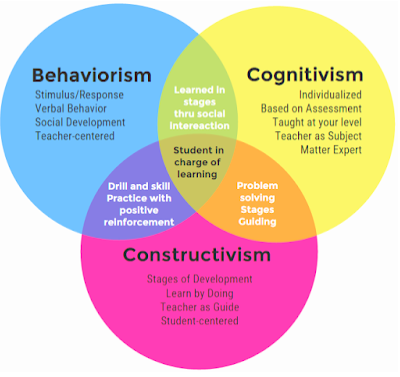I have always been intrigued by learning new things, I’m proud to say that I love to learn. However, it was a different story when it came to school. I certainly wasn’t “that kid” who looked forward to sitting through another Math-10 lecture. Now that I mention it, I’m not sure if anyone was, but the point is I wasn’t a big “school guy”. As a matter of fact, I would even skip a few of my high school classes throughout the week – usually to go fishing or skiing. I hate to toot my own horn here, but somehow I still pulled off some pretty decent grades. For example, I didn’t show up to my Bio-20 class for a month, came for the unit test, and got a 97%. I could teach myself the information just fine, yet I often got distracted in class and definitely wouldn’t learn efficiently.

(sorry mom)
After examining three major learning theories (cognitive, constructive, and behavioral), I can see that perhaps the learning theories conducted by various high school teachers may have discouraged me from attending class. Let’s take a look at these theories before I continue:
Behaviorism
Learning occurs through the reinforcement of desired behaviors. These strategies focus on observable and measurable behaviors, rather than internal mental processes. A behaviorist teacher would focus on arranging the environment to encourage students to answer questions properly (Ertmer and Newby, 2018).
Cognitive
This theory focuses on the mental processes involved in learning and emphasizes the importance of active engagement and mental effort. Strategies used in this approach would work to make the information meaningful and encourage the learner to connect it with their existing understandings (Ertmer and Newby, 2018).
Constructive
The constructive theory focuses on active, hands-on learning experiences. These strategies help learners build their own understanding of the material and promote long-term retention. A constructive teacher would encourage their students to actively participate by applying their knowledge to a real-world example (Ertmer and Newby, 2018).

With an understanding of these learning theories, I can now reflect on my personal experience and understand what does, and what does not work for my brain. This is called metacognitive awareness, and it is essential to learn efficiently. In high school, teachers often fed me information, which I would barf out on the test sheet to be forever forgotten. Many of my friends would agree. This information simply didn’t stick. After understanding these theories, It’s clear that many of my high school teachers had a behaviouristic approach to teaching. The focus was on the information and its delivery, rather than the audience and our cognitive/constructive functions. Very few of my teachers would relate the information to our existing understandings, nor relate it to real-world examples. This is why I would seek alternate support, such as YouTube or Khan Academy, where teachers would consistently explain concepts in these ways. These online instructors often challenged my existing beliefs, and encouraged me to consider “why” as opposed to just knowing “what”. After all, knowing is not the same as understanding (Veritasium, 2012). I discovered that I was able to retain information much better if I related it to existing knowledge or real-life examples, these are traits of constructive and cognitive learning theories.
It’s important to note that each individual will have different optimal learning methods, and of course, what works for me won’t necessarily work for everyone. I am, although, curious about any of your high school experiences regarding your learning atmosphere. Personally, I much more content with the learning theories carried through University so far, as much more of the work is independent and/or relatable. How about you?
References:
Ertmer, P. A. & Newby, T. (2018). Behaviorism, Cognitivism, Constructivism: Comparing Critical Features From an Instructional Design Perspective. In R. E. West, Foundations of Learning and Instructional Design Technology: The Past, Present, and Future of Learning and Instructional Design Technology. EdTech Books. Retrieved from https://edtechbooks.org/lidtfoundations/behaviorism_cognitivism_constructivism
Veritasium. (2012). Khan Academy and the Effectiveness of Science Videos. Retrieved from
Bates, T.(2014).Learning Theories and Online
Learning. [Blog post]. Retrieved from
https://www.tonybates.ca/2014/07/29/learning-theories-and-online-learning/
Anastassiya
February 2, 2023 — 12:16 pm
Hi Aiden! Thank you for sharing your learning experience and insights on theories! It looks like you were able to find that perfect life-work balance :). Good for you! I also appreciate that you mentioned that you used some personal learning strategies that helped you succeed. Metacognitive awareness is essential for deep learning. It helps control our learning and adjust strategies based on changes in our comprehension. If we know what strategies help us learn, we can learn anything.